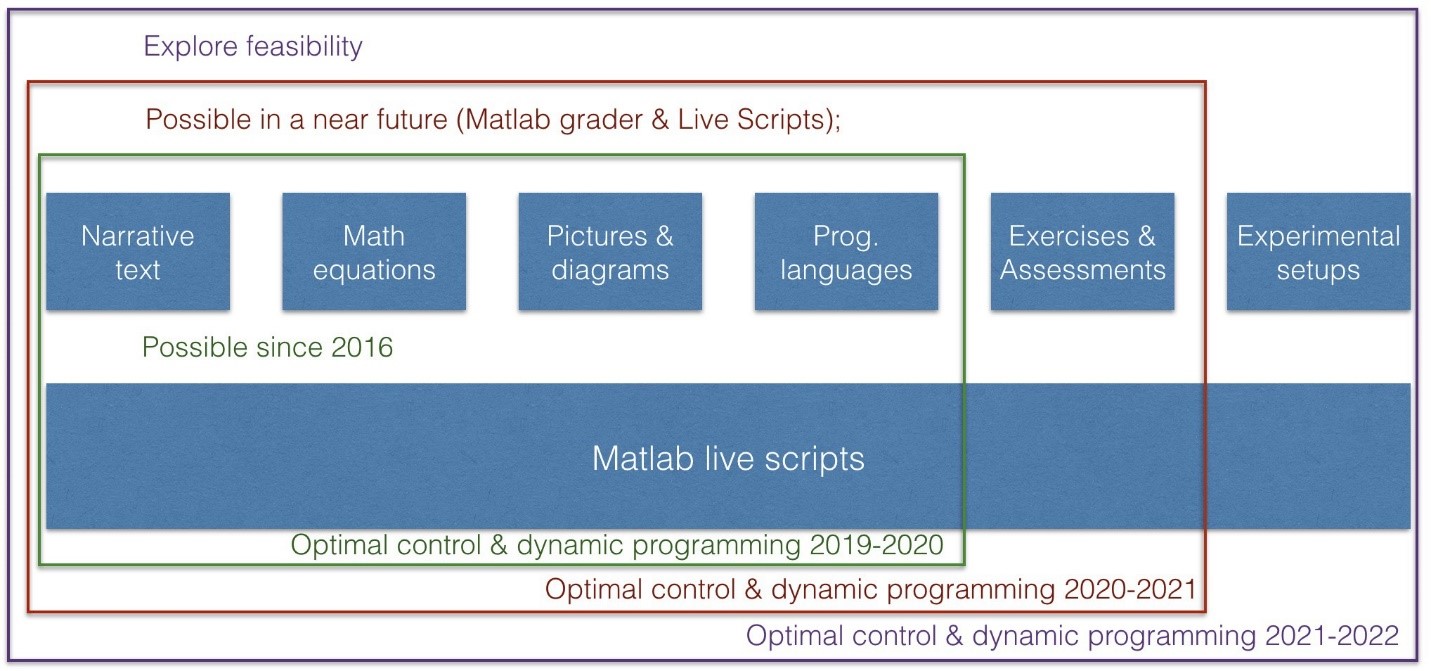Teaching, grading, and showcasing with live scripts
Summary of the Project
The project aims to address the challenge of effectively transmitting knowledge in courses using various “languages” such as narrative text, equations, diagrams, programming languages, and assessments. Traditional books with media support often fail to integrate these communication methods effectively, leading to a preference among modern students for concise explanations and code-focused learning.
To adapt to this generational shift, a unifying teaching language is sought. Jupyter Notebooks, an open-source web application, is highlighted for its ability to combine live code, equations, visualizations, and narrative text, promoting collaboration, active learning, and guided problem-solving. The popularity of Jupyter Notebooks has surged, with millions of public notebooks available, and they are widely used in fields like Machine Learning and Data Science.
However, in the Control Systems community, Matlab remains the preferred tool due to its advantages and widespread use, particularly at TU/Eindhoven. Matlab’s introduction of live scripts offers integration capabilities similar to those of Jupyter Notebooks, but its adoption in education is still limited. Future plans include integrating live scripts with Matlab Grader for automated homework grading, but further exploration is needed to fully understand their educational impact.
Aim of the Project
The project has several key objectives:
- Explore the use of live scripts as a unifying language for education, integrating lecture notes, slides, exercises, and assignments into a single document.
- Evaluate the integration of live scripts with Matlab Grader, providing a pioneering assessment of this combination.
- Integrate experimental setups that can run autonomously and be controlled remotely via live scripts.
- Make the TU/e course “Optimal Control and Dynamic Programming” available worldwide using the developed tools.
These objectives are illustrated in Figure 1, with each corresponding to the main effort for each year of the project. The fourth goal will be achieved gradually and is one of the project deliverables.
The expected outcomes include:
- A novel live script-based course on optimal control and dynamic programming, planned for the end of 2021.
- A technical article with Mathworks on student acceptance of live scripts and their integration with Matlab Grader, planned for the end of 2020.
- Presentations at major control systems conferences to disseminate the project’s findings, planned for 2020/2021.
- Local presentations at TU/e to share results throughout the project duration.
This project aims to enhance educational interactivity and effectiveness by leveraging the capabilities of Matlab live scripts and their integration with experimental setups and automated grading tools.
Results and learnings
Since 2021, the Optimal Control course has incorporated over 50 live scripts, which have proven to be an invaluable resource for students in grasping the course material. These live scripts not only enhance conceptual understanding but also serve as a practical starting point for MATLAB assignments. As such, they have become a central component and a vital medium for transmitting key concepts in the course.
The innovative use of live scripts garnered attention at the European Control Conference in 2020, where a presentation on the topic was well-received despite being delivered online due to the COVID-19 pandemic. The presentation attracted a large audience, highlighting the broader interest in this educational approach. A similar presentation at the Education Meeting for Mechanical Engineering in Q4 2021 also sparked significant interest.
Student feedback has consistently demonstrated an appreciation for the live scripts, as reflected in course evaluations over the years. In addition to lecture support, some versions of the course used live scripts to deliver homework assignments. These scripts included starter code and contextual guidance. However, students expressed a preference for text-only assignment descriptions, allowing them more autonomy in implementation.
The live scripts initiative began yielding notable results in the 2019-2020 academic year, when 24 scripts were made available. These scripts were directly linked to lecture content and embedded in the course slides. A survey conducted during this period revealed high levels of satisfaction, with an average overall rating of 8 out of 10. Student comments included:
- "They're a great tool for helping to understand the course material, and in this form, it is nicely implemented."
- "For me, it was really handy to see how the practical information from the lectures was implemented in MATLAB. With these live scripts, you could see exactly which part of the code provided a particular answer, which was very helpful."
- "The scripts were very useful for understanding the implementation of the theory and, therefore, also improved my theoretical understanding. However, not all topics are currently covered, and I believe there’s room to add more live scripts!"
- "They were neat and clear. Personally, I learn more from examples than from dry theory, so having practical implementation examples was fantastic! 6 out of 5 stars!"
Overall, live scripts have become an essential element of the Optimal Control course, enhancing both the learning experience and the practical application of theoretical concepts.

